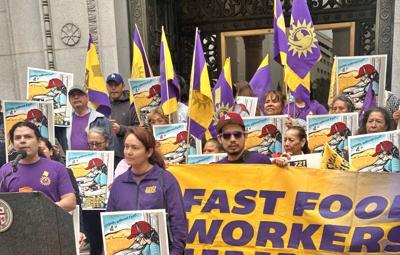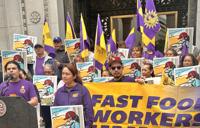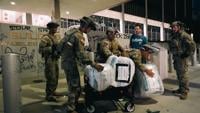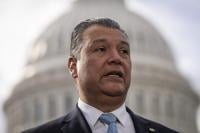
Members of the Fast Food Workers Union on Wednesday. Photo by Brenda Verano
Angelica Hernandez has been a fast food worker at McDonald's for over 20 years.
Hernandez, a permanent resident in the United States living in Los Angeles, said working for the global fast-food giant has not been easy.
“I experienced wage theft [and] sexual harassment. They used to give me two to three people's work,” she told CALÒ News.
Hernandez is one of 150,000 restaurant employees in Los Angeles, a city where the fast food industry plays a significant role in the local economy and food sector. In California, the number of fast food workers is much higher with approximately 600,000 workers, the majority of whom do not know their rights. “McDonald's would not inform us of them. I learned my rights when I joined [a] union,” she said.
Hernandez is currently a member of the California Fast Food Council, a statewide organization founded to establish industry-specific guidelines for fast food establishments with an emphasis on pay, working conditions and training. She joined a group of fast food workers, cooks, cashiers and elected officials from Los Angeles outside City Hall on Wednesday to call on the city council to enact an ordinance that would provide better protections for workers of all immigration statuses.
The Fast Food Fair Work Ordinance, introduced by City Councilmember Hugo Soto-Martinez, would codify mandatory Kknow Your Rights training that empower workers of all immigration statuses to speak out against abuses on the job.
“[The ordinance] will make sure [workers] have predictable scheduling. Many fast food workers don't know when they're going to work—there's no set schedule for many of them. They do not know if they will work next week or two weeks from now,” Soto-Martinez told CALÒ News. “It will create a Know Your Rights training. We know that there's just a lot of abuse and wage theft and exploitation in the fast food industry, as well as massive turnover. The first step to remedying that is making sure that workers know what their rights are.”
Soto-Martinez said this ordinance would also provide more clarity on paid days off, overtime and other worker rights, which are often overlooked.
Since last April, the minimum wage for fast food workers has been $20 per hour, but despite that, L.A. continues to be one of the biggest wage theft cities in the nation. According to Soto-Martinez, he hopes that this reality will encourage his coworkers at City Hall to approve and implement the ordinance without hesitation.
According to a recent story by CALÒ News, the California Labor Commissioner's Office has handled over 70,000 wage claims over the last three years, exposing significant injustices towards the state's working class. One such instance is the 2024 case in which the owner of five Wingstop locations in Bakersfield illegally and wrongfully set up the businesses as separate corporations in order to pay workers the lower minimum wage intended for small employers with 25 or fewer employees.
“This is not unusual,” Maria Maldonado, statewide director for the Fast Food Workers Union, told CALÒ News on Wednesday. “There’s an urgency again for fast food workers to learn their rights. It's very difficult for them to access sick leave or time off or get paid for overtime or extra hours and this is because their employer takes advantage of many of them not knowing their rights, especially in moments like this when there is a constant threat to immigrants.”
The California Fast Food Workers Union, along with the Coalition for Humane Immigrant Rights of Los Angeles (CHIRLA), released a report on Wednesday that revealed that nearly two-thirds of fast-food workers in California do not know that all workers, regardless of immigration status, can file workplace-related complaints, claims or lawsuits.
Hernandez claimed that many of her coworkers at McDonald's are still afraid to file any complaints due to their immigration status or because they are afraid of being fired for doing so and then being unable to find other work.
“It’s said that these multimillion-dollar companies want to silence us by not informing us about our rights. Many colleagues are undocumented. I do have papers, and even then I am afraid that [immigration enforcement] could detain me,” she said. “That is why I’m here today, fighting, standing up for all my colleagues who cannot be here today because of the fear that they might be detained or that they experience retaliation in their jobs.”
The CHIRLA and California Fast Food Workers Union report, titled “Our Rights at Work: Immigration & Labor Rights in Fast Food,” also revealed findings from their 2025 California Fast Food Worker Survey, where 405 fast food workers at over 200 fast-food locations in 66 cities across California representing 35 different brands, including McDonald’s, Jack in the Box,
Carl’s Jr., Burger King, Subway, KFC and Taco Bell, were asked about their experience.
Among those surveyed, 82% said workers worried about their immigration status are less likely to report or file complaints about workplace problems like wage theft, harassment and discrimination, or health and safety hazards.
In addition, the survey revealed that 63% of respondents do not know that all workers, regardless of immigration status, have the right to file complaints, claims and lawsuits, and 94% of respondents didn’t know about which benefits and programs are available for California workers regardless of immigration status.
Many workers fear their employer will retaliate against them via threats to their immigration status, with 82% of those surveyed saying they think fast food workers worried about their immigration status are less likely to report workplace issues.
“Their fear is real,” Maldonado said. “Many undocumented workers are scared to continue fighting, but that is why we are here.”
The report stated that over 630,000 workers are employed in California’s fast food industry, with 80% of these workers being people of color, 60% being Latinos, and over a quarter being immigrants.
The proposed ordinance would ensure workers in the City of L.A. obtain free Know our Rights training from independent organizations. Soto-Martinez told CALÒ News that was a crucial implementation because many present employers cannot be relied upon to provide their employees with accurate or comprehensive information.
“They're not going to receive these [trainings] from their employer, the same person that is exploiting them,” he said. “A worker loses an average of $1,800 a year just on wage theft. That's just unacceptable.”
Soto-Martinez said that these proposed trainings will also be tailored to the undocumented community to ensure they are not only offered in the languages workers feel more comfortable with but that are also also culturally relevant and accessible. “They won’t be a 30-minute video to watch on an iPad,” he said. “They will be interactive so people feel comfortable and open to ask questions.”
When asked if she had a message for the working-class people of L.A. Hernandez said, “No tengan miedo. We are protected and you are not alone. We are all united.”











(0) comments
Welcome to the discussion.
Log In
Keep it Clean. Please avoid obscene, vulgar, lewd, racist or sexually-oriented language.
PLEASE TURN OFF YOUR CAPS LOCK.
Don't Threaten. Threats of harming another person will not be tolerated.
Be Truthful. Don't knowingly lie about anyone or anything.
Be Nice. No racism, sexism or any sort of -ism that is degrading to another person.
Be Proactive. Use the 'Report' link on each comment to let us know of abusive posts.
Share with Us. We'd love to hear eyewitness accounts, the history behind an article.